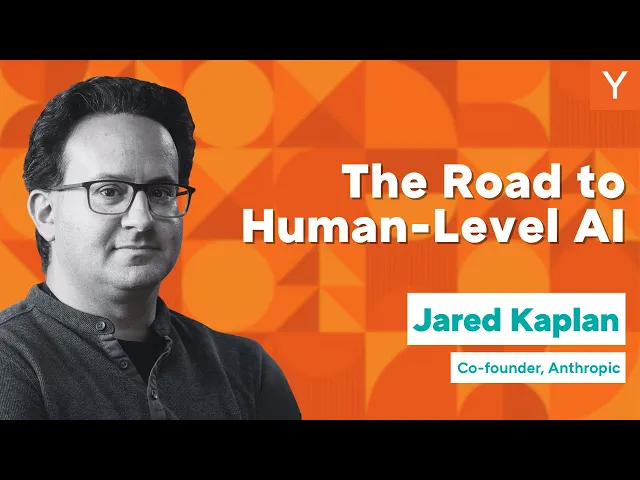Scaling and the Road to Human-Level AI | Anthropic Co-founder Jared Kaplan

Why scale is still AI's north star
In a wide-ranging conversation with Anthropic co-founder Jared Kaplan, we get a fascinating glimpse into the thinking behind one of AI's most respected research labs. Kaplan, whose work on scaling laws helped shape our understanding of how AI capabilities emerge, offers a refreshingly nuanced perspective on where AI is heading and the challenges we face in building systems that can truly understand and reason about the world.
The conversation cuts through much of the hype surrounding AI while still conveying the genuine excitement researchers feel about recent breakthroughs. For business leaders trying to separate signal from noise in the AI landscape, Kaplan's insights provide valuable context about what's real, what's coming, and what remains genuinely hard about advancing AI capabilities.
-
While more computational power and data continue to drive AI progress, we're reaching limits where simply scaling up the same techniques won't get us to human-level AI. This suggests the need for fundamental innovations in how AI systems are built.
-
The "bitter lesson" of AI research holds true – methods that leverage computation tend to win over hand-engineered approaches – but implementing this insight remains challenging in practice, requiring researchers to balance exploiting current techniques with exploring new architectures.
-
Current AI systems like Claude and GPT-4 exhibit impressive capabilities but still lack robust understanding and reasoning, particularly in domains requiring consistent, reliable performance like mathematics or complex planning tasks.
-
Emergent capabilities remain poorly understood, making it difficult to predict when qualitatively new behaviors will appear as models scale up, creating both excitement and uncertainty about AI development trajectories.
-
Anthropic's constitutional AI approach attempts to align systems with human values while maintaining performance, addressing a key challenge in deploying increasingly powerful AI systems responsibly.
What stands out most from Kaplan's discussion is his emphasis on the limitations of current systems despite their impressive capabilities. Even as models like Claude and GPT-4 can write essays, code, and engage in seemingly intelligent conversation, they lack robust understanding and reasoning abilities that humans take for granted. This gap between surface-level performance and deeper comprehension represents perhaps the most significant challenge in advancing AI systems toward more general intelligence.
This insight matters tremendously for businesses investing in AI capabilities today. The current generation of large language models represents powerful but fundamentally limited tools – extraordinarily capable at
Recent Videos
How To Earn MONEY With Images (No Bullsh*t)
Smart earnings from your image collection In today's digital economy, passive income streams have become increasingly accessible to creators with various skill sets. A recent YouTube video cuts through the hype to explore legitimate ways photographers, designers, and even casual smartphone users can monetize their image collections. The strategies outlined don't rely on unrealistic promises or complicated schemes—instead, they focus on established marketplaces with proven revenue potential for image creators. Key Points Stock photography platforms like Shutterstock, Adobe Stock, and Getty Images remain viable income sources when you understand their specific requirements and optimize your submissions accordingly. Specialized marketplaces focusing...
Oct 3, 2025New SHAPE SHIFTING AI Robot Is Freaking People Out
Liquid robots will change everything In the quiet labs of Carnegie Mellon University, scientists have created something that feels plucked from science fiction—a magnetic slime robot that can transform between liquid and solid states, slipping through tight spaces before reassembling on the other side. This technology, showcased in a recent YouTube video, represents a significant leap beyond traditional robotics into a realm where machines mimic not just animal movements, but their fundamental physical properties. While the internet might be buzzing with dystopian concerns about "shape-shifting terminators," the reality offers far more promising applications that could revolutionize medicine, rescue operations, and...
Oct 3, 2025How To Do Homeless AI Tiktok Trend (Tiktok Homeless AI Tutorial)
AI homeless trend raises ethical concerns In an era where social media trends evolve faster than we can comprehend them, TikTok's "homeless AI" trend has sparked both creative engagement and serious ethical questions. The trend, which involves using AI to transform ordinary photos into images depicting homelessness, has rapidly gained traction across the platform, with creators eagerly jumping on board to showcase their digital transformations. While the technical process is relatively straightforward, the implications of digitally "becoming homeless" for entertainment deserve careful consideration. The video tutorial provides a step-by-step guide on creating these AI-generated images, explaining how users can transform...
